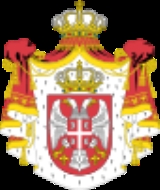
Serbian citizenship
Encyclopedia
Serbian nationality law defines who is legally a citizen
of Serbia
.
 In 2004 the National Assembly of Serbia
In 2004 the National Assembly of Serbia
passed a nationality law, which states that any foreign national with Serbian descent, is eligible for attaining Serbian citizenship. The Law also allows dual citizenship
, meaning that a person can retain his or her old citizenship and still get a Serbian one, as long as his or her own country allows dual citizenship as well.
The 2007 amendments, made ethnic Serbs
residing outside Serbia eligible for citizenship. These amendments, adopted after the Montenegrin independence referendum, 2006
also allowed citizens of Montenegro
living in Serbia to receive citizenship, if they submit the request within a 5 year period.
Citizenship
Citizenship is the state of being a citizen of a particular social, political, national, or human resource community. Citizenship status, under social contract theory, carries with it both rights and responsibilities...
of Serbia
Serbia
Serbia , officially the Republic of Serbia , is a landlocked country located at the crossroads of Central and Southeast Europe, covering the southern part of the Carpathian basin and the central part of the Balkans...
.

National Assembly of Serbia
The National Assembly of Serbia is the unicameral parliament of Serbia. It is composed of 250 proportionally elected deputies elected in general elections by secret ballot, on 4 years term. The National Assembly elects the President of the National Assembly who presides over the sessions...
passed a nationality law, which states that any foreign national with Serbian descent, is eligible for attaining Serbian citizenship. The Law also allows dual citizenship
Multiple citizenship
Multiple citizenship is a status in which a person is concurrently regarded as a citizen under the laws of more than one state. Multiple citizenships exist because different countries use different, and not necessarily mutually exclusive, citizenship requirements...
, meaning that a person can retain his or her old citizenship and still get a Serbian one, as long as his or her own country allows dual citizenship as well.
The 2007 amendments, made ethnic Serbs
Serbs
The Serbs are a South Slavic ethnic group of the Balkans and southern Central Europe. Serbs are located mainly in Serbia, Montenegro and Bosnia and Herzegovina, and form a sizable minority in Croatia, the Republic of Macedonia and Slovenia. Likewise, Serbs are an officially recognized minority in...
residing outside Serbia eligible for citizenship. These amendments, adopted after the Montenegrin independence referendum, 2006
Montenegrin independence referendum, 2006
The Montenegrin independence referendum was a referendum on the independence of the Republic of Montenegro from the State Union of Serbia and Montenegro that was held on 21 May 2006.The total turnout of the referendum was 86.5%...
also allowed citizens of Montenegro
Montenegro
Montenegro Montenegrin: Crna Gora Црна Гора , meaning "Black Mountain") is a country located in Southeastern Europe. It has a coast on the Adriatic Sea to the south-west and is bordered by Croatia to the west, Bosnia and Herzegovina to the northwest, Serbia to the northeast and Albania to the...
living in Serbia to receive citizenship, if they submit the request within a 5 year period.
Acquisition of citizenship
- Acquiring citizenship by descent
- Acquiring citizenship by birth in the territory of Serbia
- Acquiring citizenship by admission (naturalization)
Termination of citizenship
- Termination of citizenship by release
- Termination of citizenship by renunciation
- Reacquisition of citizenship by the Republic of Serbia

